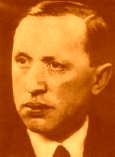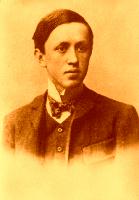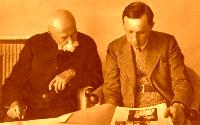Karek Čapek
(1890-1938)
real founder of the Czech
science fiction

* 9. 1. 1890 Malé Svatoňovice
near Trutnov
+ 25.12.1938 Praha

Karel Čapek as young boy

Karel Čapek and the President Tomáš Garique Masaryk
Karek Čapek
(1890-1938)
real founder of the Czech
science fiction

* 9. 1. 1890 Malé Svatoňovice
near Trutnov
+ 25.12.1938 Praha

Karel Čapek as young boy

Karel Čapek and the President Tomáš Garique Masaryk
DOMAIN: Oh, hang the factory. But you shall see everything, Miss Glory, indeed you shall. Please sit down. Would you like to hear the story of the invention?
HELENA: Yes, please.
DOMAIN: Well, then. (Sits down with writing-table, looks at HELENA with rapture and reels off rapidly) It was the in the year 1922 that old Rossum the great physiologist, who was then quite a young scientist, betook himself to this distant island for the purpose of studying the ocean fauna, full stop. On this occasion he attempted by chemical synthesis to imitate the living matter known as protoplasm, until he suddenly discovered a substance which behaved exactly like living matter, although its chemical composition was different; that was in the year 1932, exactly 400 years after the discovery of America, whew!
HELENA: Do you know that by heart?
DOMAIN: Physiology, Miss Glory, is not my line. Shall I go on?
HELENA: Please do.
DOMAIN: (Solemnly) And then, Miss Glory, old Rossum wrote the following day in his book: "Nature has found only one method of organizing living matter. There is, however, another method more simple, flexible, and rapid, which has not yet occurred to nature at all. This second process by which life can be developed was discovered by me today." Imagine him, Miss Glory, writing those wonderful words. Imagine him sitting over a test tube and thinking how the whole tree of life would grow from it, how animals would proceed from it, beginning with some sort of beetle and ending with man himself. A man of different substance from ours. Miss Glory, that was a tremendous moment.
HELENA: Go on, please.
DOMAIN: Now the thing was, how to get the life out of the test tube and hasten development: to form organs, bones and nerves, and so on: to find such substances as catalytics, enzymes, hormones, and so forth, in short -- you understand?
HELENA: I don't know. Not much, I'm afraid.
DOMAIN: Never mind. You see, with the help of his tinctures he could make whatever he wanted. He could have produced a Medusa with the brain of a Socrates or a worm fifty yards long. But being without a grain of humor, he took it into his head to make a normal vertebrate. This artificial living matter of his had a raging thirst for life. It didn't mind being sewn up or mixed together. THAT, you'll admit, couldn't be done with natural albumen. And that's how he set about it.
HELENA: About what?
DOMAIN: About imitating
nature. First of all he tried making an artificial dog. That
took him several years and resulted in a sort of stunted calf which died
in a few days. I'll show it you in the museaum. And then old
Rossum started on the manufacture of man.
(pause)
HELENA: And I must divulge this to nobody?
DOMAIN: To nobody in this world.
HELENA: It's a pity that it can already be found in every school lesson book.
DOMAIN: Yes. (Jumps up from the table and sits down beside HELENA.) But do you know what isn't in the lesson books? (Taps his forehead) That old Rossum was quite mad. Seriously, Miss Glory, you must keep this to yourself. The old crank actually wanted to make people.
HELENA: But you do make people.
DOMAIN: Synthetically, Miss Helena. But old Rossum meant it actually. He wanted to become a sort of scientific substitute for God, you know. He was a fearful materialist, and that's why he did it all. His sole purpose was to supply proof that Providence was no longer necessary. So he took it into his head to make people exactly like us. Do you know anything about anatomy?
HELENA: Only a very little.
DOMAIN: So do I. Imagine then that he decided to manufacture everything as in the human body. I'll show you in the museum the bungling attempt it took him ten years to produce. It was to have been a man, but it lived for three years only. Then up came young Rossum, an engineer, the nephew of old Rossum. A wonderful fellow, Miss Glory. When he saw what a mess of it the old man was making, he said: "It's absurd to spend ten years making a man. If you can't make him quicker then nature, you may as well shut up shop." Then he set about learning anatomy himself.
HELENA: There's nothing about that in the lesson books.
DOMAIN: (Standing up) The lesson books are full of paid advertisement and rubbish at that. For example, it says there that the Robots were invented by an old man. But it was young Rossum who had the idea of making living and intelligent working machines. What the lesson books say about the united efforts of the two great Rossums is all a fairy tale. They used to have dreadful rows. The old atheist hadn't the slightest conception of industrial matters, and the end of it was that young Rossum shut him up in some laboratory or other and let him fritter the time away with his monstrosities, while he himself started on the business from an engineer's point of view. Old Rossum cursed him, and before he died he managed to botch up two physiological horrors. Then one day they found him dead in the laboratory. That's the whole story.
HELENA: And what about the young man?
DOMAIN: Well, anyone who's looked into anatomy will have seen at once that man is too complicated and that a good engineer could make him more simply. So young Rossum began to overhaul anatomy and tried to see what could be left out or simplified. In short -- but this isn't boring you, Miss Glory?
HELENA: No, on the contrary, it's awfully interesting.
DOMAIN: So young Rossum said to himself: a man is something that, for instance, feels happy, plays the fiddle, likes going for walks, and, in fact, wants to do a whole lot of things that aren't fully necessary.
HELENA: Oh!
DOMAIN: Wait a bit. That are unnecessary when he's wanted, let us say, to weave or count. Do you play the fiddle?
HELENA: No.
DOMAIN: That's a pity. But a working machine must not want to play the fiddle, must not feel happy, must not do a whole lot of other things. A petrol motor must not have tassels or ornaments, Miss Glory. And to manufacture artificial workers is the same thing as to manufacture motors. The process must be the simplest, and the product must be the best from a practical point of view. What sort of worker do you think is the best from a practical point of view?
HELENA: The best? Perhaps the one who is most honest and hard-working.
DOMAIN: No, the cheapest. The one whose needs are the smallest. Young Rossum invented a worker with the minimum amount of requirements. He had to simplify him. He rejected everything that did not contribute directly to the progress of work. He rejected everything that makes man more expensive. In fact, he rejected man and made the Robot. My dear Miss Glory, the Robots are not people. Mechanically they are more perfect than we are, they have an enormously developed intelligence, but they have no soul. Have you ever seen what a Robot looks like inside?
HELENA: Good gracious, no!
DOMAIN: Very neat, very
simple. Really a beautiful piece of work.
|
|
|
|
|
|
|